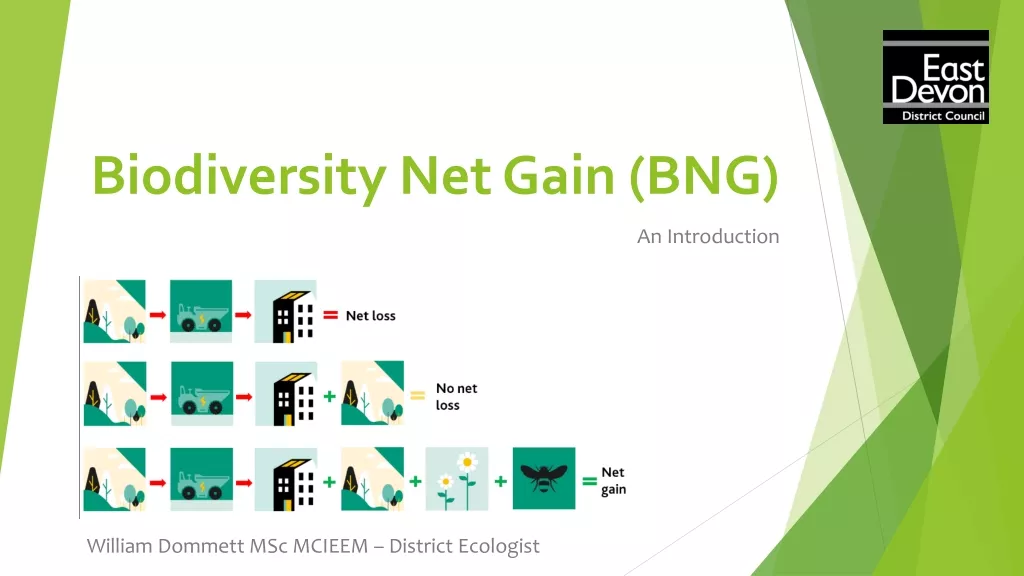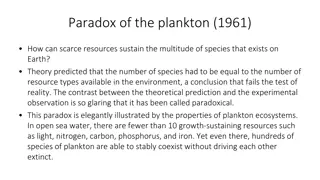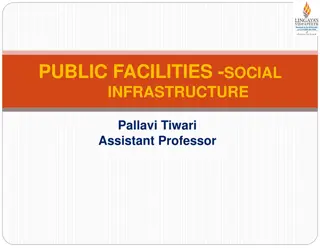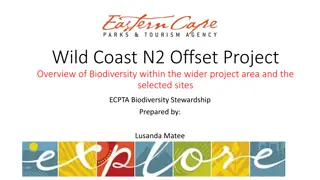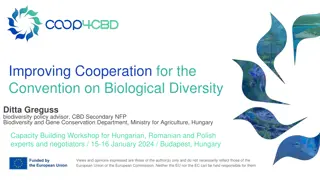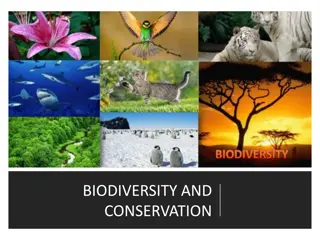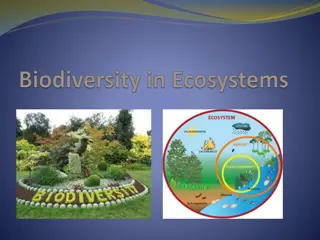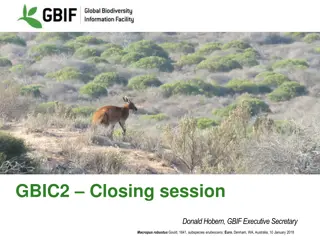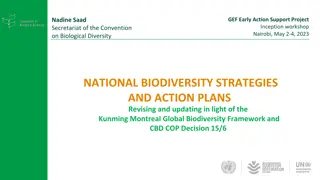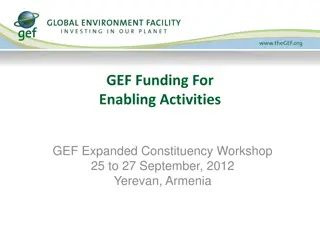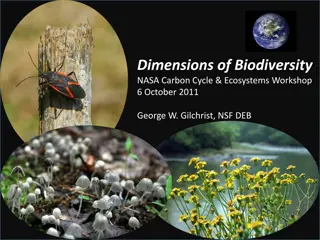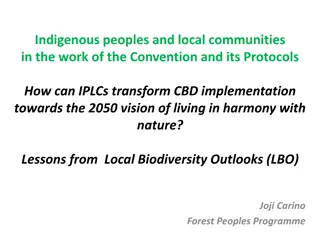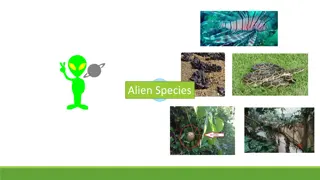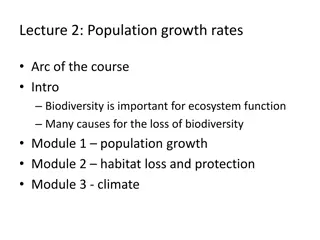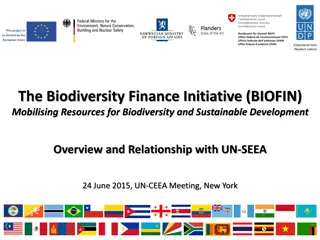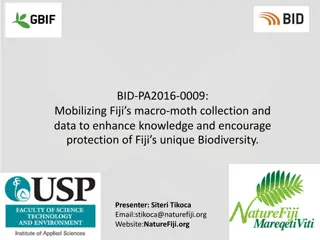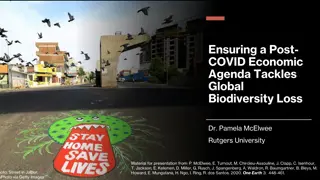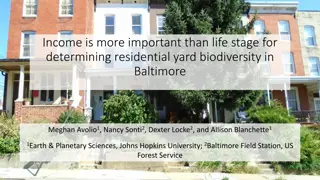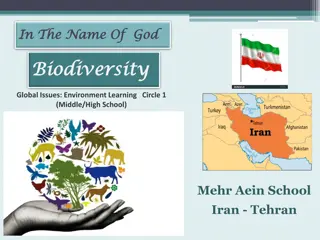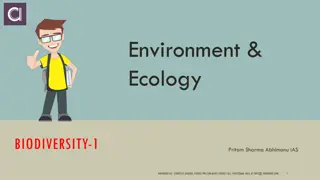Knowledge Management for Biodiversity
Join the KM4B Webinar Series to learn about knowledge management in the context of biodiversity, its protocols, and the importance of accessible data and information for effective biodiversity governance. Explore key initiatives and tools supporting the collection, curation, and sharing of biodiversity knowledge.
Uploaded on Dec 21, 2023 | 3 Views
Download Presentation

Please find below an Image/Link to download the presentation.
The content on the website is provided AS IS for your information and personal use only. It may not be sold, licensed, or shared on other websites without obtaining consent from the author.If you encounter any issues during the download, it is possible that the publisher has removed the file from their server.
You are allowed to download the files provided on this website for personal or commercial use, subject to the condition that they are used lawfully. All files are the property of their respective owners.
The content on the website is provided AS IS for your information and personal use only. It may not be sold, licensed, or shared on other websites without obtaining consent from the author.
E N D
Presentation Transcript
KM4B Webinar Series Knowledge Management for Biodiversity (KM4B) - Webinar 1 Introduction to KM under the Convention and its Protocols Erie Tamale Capacity Building and Knowledge Management Unit Implementation Support Division
KM4B Webinar Series AGENDA Knowledge Management in the context of Kunming Montreal Global Biodiversit Framework Knowledge Management for Biodiversity Webinar Series Implementation time table Knowledge for Development Partnership 2
KM4B GBF - Target 21 Webinar Series (What ) Ensure that the best available data, information and knowledge are accessible to decision makers, practitioners and the public to (Why ) guide effective and equitable governance, integrated and participatory managementof biodiversity, and to strengthen communication, awareness- raising, education, monitoring, research and knowledge management and, also in this context, traditional knowledge, innovations, practices and technologies of indigenous peoples and local communities should only be accessed with their free, prior and informed consent in accordance with national legislation. QUALIFIER Traditional knowledge, innovations, practices and technologies of indigenous peoples and local communities should only be accessed with their free, prior and informed consent in accordance with national legislation.
KM4B GBF - Target 21 Webinar Series Related AICHI Target Related SDG Target Target 19 - By 2020, knowledge, the science base and technologies relating to biodiversity, its values functioning, status and trends, and the consequences of its loss, are improved, widely shared and transferred, and applied. 14.a Increase scientific knowledge, develop research capacity and transfer marine technology, taking into account the Intergovernmental Oceanographic Commission Criteria and Guidelines on the Transfer of Marine Technology, in order to improve ocean health and to enhance the contribution of marine biodiversity to the SD
KM4B Biodiversity KM Landscape Webinar Series Key initiatives and tools supporting the collection, curation and sharing of biodiversity data, information and knowledge: CBD CHM & KM tools of other biodiversity-related MEAs InforMEA (UN Information Portal on MEAs) UNEP-WCMC UNEP's World Environment Situation Room (WESR) UN Biodiversity Lab (UNDP) IPBES task force on knowledge and data GEOBON: Group on Earth Observations Biodiversity Observation Network IUCN's Species Information Service (IUCN red list) Global Biodiversity Information Facility (GBIF), Encyclopedia of Life (EOL) International Barcode of Life Initiative (iBOL)
KM4B Background Webinar Series 5th Global Biodiversity Outlook (GBO-5) noted that: Progress has been made in the generation and sharing of biodiversity data, information and knowledge (DIK) Digital technologies (e.g. big-data aggregation, modelling and artificial intelligence) have opened new opportunities for KM Major imbalances remain (geographic and thematic coverage of available information) and digital divide Information gaps remain Full use/ application of biodiversity knowledge in decision-making is still limited in some countries
KM4B KM Component of the GBF Webinar Series Goal and objectives: To support effective implementation of the post-2020 global biodiversity framework Promote a culture of knowledge sharing Create enabling environment for biodiversity KM Leverage existing KM initiatives and networks Increase the discoverability & accessibility of biodiversity data, information and knowledge from multiple sources Strengthen biodiversity knowledge networks and Communities of Practice Strengthen national capacities to access and utilise existing biodiversity data, information and knowledge 7
KM4B KM Component of the GBF Webinar Series Strategies to enhance biodiversity KM A. Knowledge creation/generation New knowledge from research, case studies, etc. Analysis and integration of existing DIK B. Knowledge discovery and collection Identification of biodiversity DIK from various sources Promotion of knowledge discovery technologies, e.g. data mining and machine learning Proactive engagement of knowledge creators, brokers Crowdsourcing of DIK C. Knowledge organization and sharing: Organization, classification/cataloging and mapping using appropriate metadata and descriptors for easy findability, searchability, accessibility and retrieval
KM4B KM Component of the GBF Webinar Series Improvement of metadata quality, tagging & mapping Harmonization of data standards, protocols, formats Enhancement of interoperability across biodiversity-related information systems D. Knowledge uptake and use/application Enhanced communication/marketing of existing DIK Strengthening the science-policy interface (e.g. IPBES) Creating spaces for dialogue between researchers & policy/decision-makers and practitioners Promoting communities of practice and citizen science E. Knowledge audits and reviews Evaluation of how and where DIK is accessed & used Identification of user information needs and gaps
KM4B Key Observations and Lessons Webinar Series KM is one of the key means of implementation that will underpin the GBF goals and targets Easy and timely access to available biodiversity DIK is critical for effective biodiversity planning, policy/decision-making and implementation Significant biodiversity DIK exist but are often not readily accessible to potential users Need to facilitate the discovery and accessibility of existing biodiversity DIK from all sources Knowledge for Development Partnership 10
KM4B Key Observations and Lessons Webinar Series There is also a need to: Leverage existing biodiversity KM initiatives and networks, Address the knowledge gaps, Identify and address factors that prevent full access to and usage of existing knowledge Enhance coordination and collaboration among relevant KM initiatives, including the KM4AgD
KM4B KM4B Webinar Series: Motivation Webinar Series Knowledge needs to be managed professionally across organisations to create vital and performative knowledge ecosystems. Qualified Knowledge Managers are needed in all sectors and at all levels, and they profit from joint learning and experience sharing. Due to the complexity and distribution of knowledge in the biodiversity they need to master the KM Challenges together. Solutions to be developed and implemented in partnership based on an integrated KM approach. Knowledge for Development Partnership 12
KM4B Webinar Series Knowledge Management for Biodiversity (KM4B) Initiative Knowledge for Development Partnership
KM4B Webinar Series Knowledge Agenda for Biodiversity (initial idea) Knowledge for Development Partnership
KM4B Webinar Series KM4B Webinar Series Scheduled Programme https://km4b.cbd.int/webinars
KM4B Webinar Series Appendix
KM4B Content Webinar Series Knowledge is at the heart of the post-2020 biodiversity agenda KM for Biodiversity Challenge 2023 Implementation time table Knowledge for Development Partnership 17
KM4B Webinar Series Concept brief
KM4B KM4B Initiative Webinar Series A joint programme of the CBD, hosted by UNEP, and the Knowledge for Development Partnership National focal points of all CBD Parties to join the KM4B Challenge 2023 Faculty with 20+ TOP KM experts with specialisations in biodiversity 20 training sessions of 1,5 hours and online learning material on organisational and sectoral Knowledge Management with strong interaction and peer collaboration. Participants will be guided to: develop their own organisational Knowledge Management Strategies co-create sectoral/national Knowledge Policy Briefs jointly develop the Biodiversity Knowledge Agenda Participants shall be awarded Certified Knowledge Managers for Sustainable Development Solutions and findings are presented at regional conferences A Biodiversity KM Community of Practice (CoP) launched Knowledge for Development Partnership 19
KM4B Partnership for the KM4B Webinar Series The Convention on Biological Diversity (CBD) Secretariat, hosted by UNEP, K4DP and other partners will join forces in the implementation of the KM4D Challenge. CBD Parties will receive professional advice on pressing KM Challenges and build KM capacities in the sectors. The SCBD will facilitate the collaboration to formulate KM Challenges and provide background information, including various aspects like knowledge sharing practices, knowledge divide, technical aspects of linking data, use of Artificial Intelligence, etc. The CBD Parties will receive results and bring them to implementation where possible. The CBD Secretariat will communicate and mobilize participants from Parties to join the KM4B Challenge and arrange their participation. Knowledge for Development Partnership 20
KM4B Faculty members (selected) Webinar Series Benjamin Abugri MSc, FARA/University of Ghana, Accra Dr. Andreas Brandner K4DP/Knowledge Management Austria Sarah Cummings, Knowledge Ecologist/km4dev Prof. Dr. Kimiz Dalkir, McGill University, Canada Helen Gillman MSc, IFAD (tbc) Prof. Dr. Stefan G ldenberg, University of Liechtenstein Dr. Michael Heiss, Siemens Mag. Petra Herout, KMA / HORIZONT3000 Prof. Dr. Kingo Mchombo, International University of Management, Namibia Prof. Dr. hc. G nter Koch, KM Austria, Humboldt Cosmos Multiversity Patricia Lumba MSc, African Union Interafrican Bureau for Animal Resources (AU-IBAR) Prof. Dr. Peter Pawlowsky, Technical University of Chemnitz, Germany Davide Piga MSc, World Bank (tbc) Knowledge for Development Partnership 21
KM4B Faculty members (selected) Webinar Series Prof. Dr. Vincent Ribiere, Bangkok University Dr. Charles Savage, Knowledge Era Enterprises Dr. Claus Otto Scharmer, Massachusetts Institute of Technology (MIT) Cambridge, USA (tbc) Prof. Dr. Eric Tsui, Polytechnical University of Hongkong Mag. Birgit Gobi, Hewlett Packard Enterprise John Hovell, Stratactical, US Michael Victor MSc, ILRI (tbc) Knowledge for Development Partnership 22
KM4B Webinar Series Knowledge Management for Biodiversity Challenge 2023 Timetable Knowledge for Development Partnership
KM4B Timetable Webinar Series Sep Oct Feb Apr May Jun Jul Aug Mar Jan 2 Regional Challenge A 4 Global Conference 3 Integration and Global Challenges 1 Global Kickoff Dissemination 2 Regional Challenge B 2 Regional Challenge C 2 Regional Challenge D Knowledge for Development Partnership 24
KM4B Contact Webinar Series Erie Tamale Head, Capacity Building and Knowledge Management Unit CBD Secretariat Email: erie.tamale@un.org Prof. Dr. Andreas Brandner, Executive Director Knowledge for Development Partnership Email: andreas.brandner@k4dp.org www.k4dp.org Knowledge for Development Partnership 25



